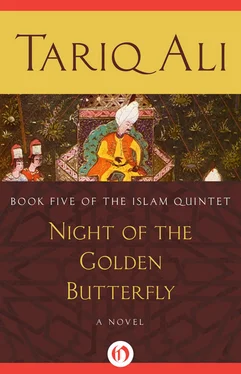‘His first and last present to me was a well-worn edition of Ulysses . The Arabic numerals obviously refer to the page number.’
She had to go herself to fetch the book, since the maids could not decipher English titles. All present insisted they had read it, though I knew Zahid and Confucius were definitely lying, unless Confucius had read it during the memory-lapse period. It turned out he had, and Yu-chih informed us that there were two Chinese translations, the older of which was more loyal to the original. Given that some people find Joyce’s later work incomprehensible, I wondered what the Chinese translation might be like. How could JJ possibly be made to work in another language?
An excited Zaynab had found the page and was going through each line. Then she found it and screamed. ‘It’s Stephen Dedalus. He’s just been reflecting on the mathematical discipline of the medieval Arabs, and in particular algebra — al-jabra — and its symbols. He sees them as “wearing quaint caps of squares and cubes”, but listen to this: “… imps of fancy of the Moors. Gone too from the world, Averroes [Ibn Rushd] and Moses Maimonides [Ibn Maymun], dark men in mien and movement, flashing in their mocking mirrors the obscure soul of the world, a darkness shining in brightness which brightness could not comprehend.”’
How had I missed that? Was he in Trieste already when the thought occurred? Thinking of the tortured history of his country, his continent and his religion, he had remembered another world. Clever, clever Plato. The panel was unanimously awarded a new title, ‘The Obscure Soul of the World’. JJ’s tribute to an exterminated civilization as recovered by Mohammed Aflatun, deceased. He had never mentioned it to me or to anyone else.
What could the last section of the triptych contain? There was a sense of expectation as we crowded close to examine the work. It was very different from the previous two. This was personal. It consisted of four large and six small panels. Each contained a portrait or a miniature. These were painted short stories. Two small self-portraits of Plato, one showing him as a young man, his face filled with pain, and the other as an old one, with the cancer-ravaged features of the last period. There was the table in the college café in Lahore, around which we were all grouped in the shadows of a pipal tree, with Confucius the most obviously recognizable. Satire had crept in here, with the more reflective types wearing spectacles, the talkative triumvirate with tongues hanging out, and me, licking my spectacles clean. The most straight-laced portrait, and yet funniest for those of us in the know, showed Zaynab covered from head to toe, a pious look on her face, sitting cross-legged on a takhtposh . Lying next to her was the Holy Book. She was holding an unlit candle. The fact that it was unlit was remarked on by everyone. Zaynab and I did not dare look at each other.
‘It must mean something, Dara,’ said Yu-chih. ‘You must have some explanation.’
‘Of course there is,’ I said, racking my brains and trying not to laugh. ‘It’s obvious. Even though Plato was not religious, he was understanding of our faith in his last days. You cannot show a lit candle next to the Honoured Classic. The light emanating from the Book is all you need.’
Zaynab sighed with relief. The rest applauded. There were a few vintage Plato paintings. In one, a dwarf with upraised sword was guarding the pudendum of a crowned lady while a crowned male was happily helping himself to her behind. The Punjabis present roared with delight. Plato was reminding himself and us of the famous impromptu remark that had once reduced an entire theatre to helpless laughter and projected its author onto a larger frame. Alice had not heard the story and — by now fully recovered from her stomach problems — laughed without restraint.
A satirical miniature depicted Jindié and me sporting in Mughal costume in the Shalimar Gardens, below the marble canopy, though I had been given a few Chinese features. I’m lying with my head on Jindié’s lap playing with a flower. Sweet birds fly above. A dropping from one of them is headed straight for my face. A sitar player, who looks suspiciously like Plato, is strumming away below us. One of Jindié’s breasts, something I have yet to see, was delicately displayed, causing a bit of embarrassment to her brother and husband. Then I noticed that it wasn’t simply that. A tiny portion of my anatomy was peeping out in hope. Zaynab gave me a quick glance, pretending she was coughing to cover her giggle, and said, ‘I think this is my favourite one in the last panel.’
‘Oh, no,’ said Yu-chih. ‘It’s too obvious. The unlit candle is the one I really like. It’s so subtle.’
I agreed a bit too loudly.
Plato’s favourite poets were represented, too, and unlike his friends, they had been treated with possibly too much reverence. Here they all were. Faiz, cigarette firmly held in the same hand that is close to his mouth, suppressing the cough that often interrupted his readings. The other hand is resisting the overtures of a society beauty, while in the background Plato’s wall of humanity has been miniaturized from the first painting; their faces, filled with agony, plead for something. A homage to Faiz’s most famous poem, whose first line, ‘Lover, do not ask for that old love again’, is the prologue to verses that explain why he should not. Not because the poet has found another lover, like poor Ibn Zaydun, but because ‘there are other ailments in this world outside the pain of love’. Like the pain of oppression, felt by the poor.
And here is Sahir Ludhianvi, from Plato’s old city in pre-Partitioned India. He was not recognized by any of the others, and I only knew him because we used to recite his poetry all the time as young men. It was easier to grasp than Faiz’s, didactic, and had a Brechtian ring to it though it has survived less well than the work of the great German poet. An explanation is unavoidable. Why is Sahir standing with his trousers at his feet? He is facing us with a mischievous look on his face and a drooping little penis. We can’t see his naked backside because he’s busy showing it to the Taj Mahal, which is being photographed by the tourist hordes. One of Sahir’s sharpest poems is a response to his beloved, who suggests a rendezvous in the moonlight outside the Taj. The poet’s reply is at once moving and brutal, denouncing the monument as the indulgence of an emperor who used his wealth as a crutch ‘to make fun of the love that we, the poor, feel’. How many died building this absurdity, asks the poet of his lover. Ever think of them? Were they never in love? Were their emotions less pure? In Plato’s portrait, the Taj is cracked from side to side, and the cracks, tiny impressionist blobs, are painted in similar colours to the cancers depicted in the first painting. As for the penis, here Plato is suggesting, accurately, that the poet suffered from an ailment like that of the man who painted him. I did not mention this, though Ally and Zaynab exchanged a quick look.
The last three figures are much-loved Punjabi poets from the seventeenth and eighteenth centuries, presented as tribunes of the people. It is the triumvirate of Waris Shah, Bulleh Shah and Shah Hussain, more holy for many Punjabis than the most devout preachers of any religion. No portraits of them were ever made. Plato paints them as angelic Punjabi peasants: Waris Shah is rescuing Heer from the wedding palanquin; Bulleh Shah is frowning at mosque and temple and reprimanding mullah and Brahmin, done in miniature. And Shah Hussain, who publicly flaunted his male Hindu lover Madho Lai in the streets of Lahore and wrote love songs for him, is shown naked in his arms, but not in bed. They embrace in the streets of Lahore as an admiring public, similar to the faces in the wall of humanity in the previous panel, watches the pair. Plato’s imagination here rested on fact. When Shah Hussain died, the mullahs ordered that his body be left to rot in the sun, since he had breached Koranic injunctions. It is written that tens of thousands of the poet’s admirers defied the mullahs. His body was publicly bathed and shrouded in the red colour he loved and buried with great fanfare and singing.
Читать дальше












